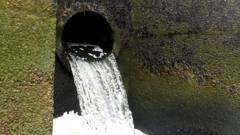Failing water sector needs stronger regulation, review says

SpaceX advances space exploration with successful Starlink launch and Starship test, while Blue Origin reveals ambitious lunar lander and tanker plans, marking a thrilling era in private space innovation.

All major sources, one page
Feel the mood behind headlines
Know what’s trending, globally
Get summaries. Save time
7,352
143
211
9 minutes ago
Get instant summaries, explore trending stories, and dive deeper into the headlines — all in one sleek, noise-free mobile experience.
Stay sharp in 60 seconds. Get concise summaries of today’s biggest stories — markets, tech, sports, and more
All major sources, one page
Feel the mood behind headlines
Know what’s trending, globally
Get summaries. Save time
7,352
143
211
9 minutes ago
Get instant summaries, explore trending stories, and dive deeper into the headlines — all in one sleek, noise-free mobile experience.
Stay sharp in 60 seconds. Get concise summaries of today’s biggest stories — markets, tech, sports, and more